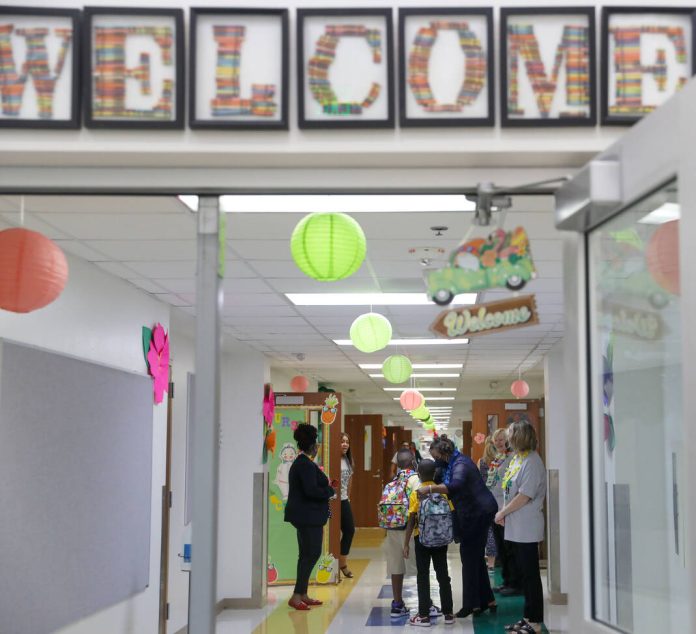By TALIA RICHMAN
The Dallas Morning News
Texas lawmakers pledged to tackle persistent teacher shortages when they reconvene in Austin this month.
They’re looking for solutions to lagging teacher pay, retention woes and recruitment challenges.
While schools across the nation also are dealing with a dearth of educators, some Texas-specific issues exacerbate the problem here. Among them: The largest teacher preparation program in the state is failing state standards and could lose accreditation.
Meanwhile, roughly three-quarters of Texas teachers say they’ve seriously considered leaving the profession, according to a fall poll by the Charles Butt Foundation.
“We can’t start sacrificing quality just to address the teacher shortage. I’m a firm believer we can do both,” Rep. James Talarico, D-Round Rock, said. “We can figure out how to walk and chew gum at the same time.”
Gov. Greg Abbott, a Republican, convened a Teacher Vacancy Task Force that is expected to have its recommendations finalized by February.
To help with fixes, researchers provided an updated picture of today’s landscape. The University of Houston recently published a study of who Texas’ teachers are, how they find their way to the classroom and whether they stay there.
Here’s what they found.
The Texas teacher workforce does not mirror the student population it serves.
SHORT ON DIVERSITY
Roughly 57% of teachers are white, compared with about a quarter of students in Texas public schools.
Still, over the past decade, more teachers of color have entered classrooms. In 2012, nearly two-thirds of educators identified as white. Slowly, districts are recruiting more Black and Hispanic teachers.
That is essential as research shows students benefit from a diverse teaching force.
And while Texas is home to large numbers of immigrant students, it’s seen shortages in bilingual educators for roughly 30 years.
HOW ARE TEXAS TEACHERS PREPARED?
Texas has been called the “wild west” of teacher preparation. It has many different paths people can take into the classroom, which are loosely regulated.
The state had 122 approved educator prep programs as of 2022, the University of Houston report found. Ever since 2015, more Texas teachers earn certification through for-profit, alternative certification programs than any other pathway, including universities.
The for-profit, alternative certification programs accounted for 58% of new standard certifications produced statewide last year, the report found.
“This trend is concerning, as research suggests teachers who choose ACPs go into the classroom with less experience and have higher attrition rates,” the authors wrote.
Supporters of alternative programs say they offer candidates flexible access to the profession. They prepare larger numbers of Black teacher candidates, which is helping diversify the workforce.
HOW MUCH DO TEXAS TEACHERS EARN?
The average base pay of Texas teachers last year was comparable to what educators made in 2016, when adjusted for 2021 dollars.
That average of $57,600 last year was up from nearly $56,000 in 2012, when adjusted for inflation.
Salaries are dependent on where a teacher works, both in terms of what kind of school and what region they’re in.
Teachers at charter campuses are paid, on average, about 9% less than those at traditional public schools. Such educators cut the gap in half since 2012, when those teachers made roughly 18% less.
School districts are increasingly turning to a program modeled off of Dallas ISD that allows some teachers to get big raises if they prove effectiveness. This salary scale replaces one in which teachers are paid based on years of experience.
Nearly 400 districts and partners are in the process or have completed their approval to participate in the Teacher Incentive Allotment.
WHAT SOLUTIONS ARE POSSIBLE?
So far, Abbott’s task force has explored possible solutions that could include expanding teacher mentorship programs, boosting yearlong, paid educator residencies and restructuring school schedules to allow for more planning time.
Several bills have already been filed that would impact teachers.
Among them is an ambitious — and expensive — plan by Rep. Diego Bernal to help pay college students’ tuition if they study education and pledge to devote a certain amount of time to teaching in the classroom afterward. At the same time, a percentage of existing teachers would be paid a retention incentive to continue working in schools.
“We have to find a way to keep teachers in the profession while we support and fill the pipeline,” said Bernal, D-San Antonio.
Another bill, from North Texas Republican Rep. Matt Shaheen, would establish a program allowing military veterans to earn a temporary teaching certificate under a revised set of rules.
Florida recently made a similar move in an attempt to combat vacancies.
The DMN Education Lab is a community-funded journalism initiative, with support from The Beck Group, Bobby and Lottye Lyle, Communities Foundation of Texas, The Dallas Foundation, Dallas Regional Chamber, Deedie Rose, Garrett and Cecilia Boone, The Meadows Foundation, The Murrell Foundation, Solutions Journalism Network, Southern Methodist University, Sydney Smith Hicks, Todd A. Williams Family Foundation and the University of Texas at Dallas. The Dallas Morning News retains full editorial control of the Education Lab’s journalism.




